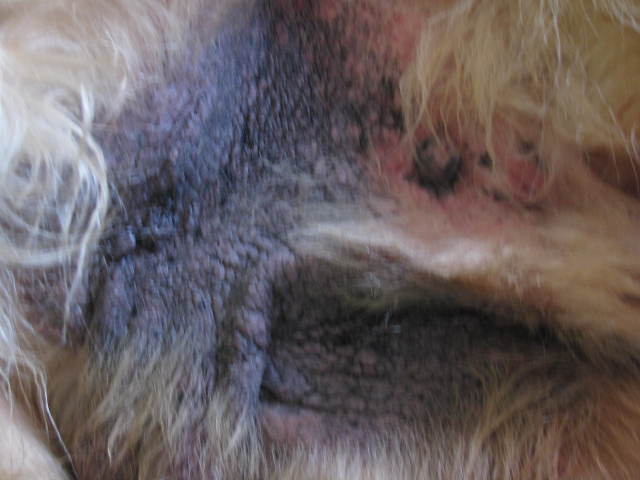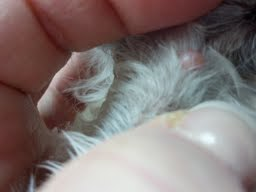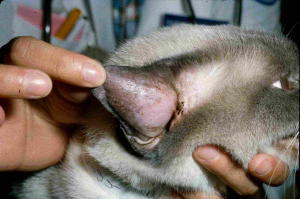QuestionI don't know if I should put my dog to sleep. She is a giant breed, ten years old, and has hip dysplasia and arthritis. She can't get up or walk without my help. She is on five medications including two for pain but she is still eating on her own. When I took her in for a checkup a few months ago the vet said it was time to think about putting her to sleep. I'm afraid that some day she just won't get up but on the other hand I wonder if I should try a wheelchair for her. She is very very sweet but snapped at me once only because I must have hurt her when trying to help her up. She is my best friend and I want to hold on to her but don't want her to suffer. Please let me know what you think I should do. Either way I will feel so guilty. Thanks.
AnswerThis is a very hard thing to go through Marie, as I am sure you are already feeling.
There are some criteria you can use to help you determine more objectively whether or not your dog is suffering and what kind of quality of life she has right now.
You are right about one thing- one day she won't be able to get up at all. Wheelchairs are usually designed for smaller dogs that have lost rear-end mobility- such as paralysis from an accident or diseases discs. They are not very useful for a giant breed that has painful arthritis on top of not being able to walk. How would she propel herself if her front legs are painful too?
Here is a list we call the Quality of Life index:
HURT - Adequate pain control, including breathing ability, is first and foremost on the scale. Is the pet's pain successfully managed? Is oxygen necessary?
HUNGER - Is the pet eating enough? If the pet is refusing food then it's telling you that it is time. Force feeding will not change this.
HYDRATION - Is the patient dehydrated? For patients not drinking enough, use subcutaneous fluids once or twice daily to supplement fluid intake.
HYGIENE - The patient should be brushed and cleaned, particularly after elmination. Avoid pressure scores and keep all wounds clean.
HAPPINESS - Does the pet express joy and interest? Is the pet responsive to things around him or her (family, toys, etc.)? Is the pet depressed, lonely, anxious, bored or afraid? Can the pet's bed be close to the family activities and not be isolated?
MOBILITY - Can the patient get up without assistance? Does the pet need human or mechanical help (e.g. a cart)? Does the pet feel like going for a walk? Is the pet having seizures or stumbling? (Some caregivers feel euthanasia is preferable to amputation, yet an animal who has limited mobility but is still alert and responsive can have a good quality of life as long as caregivers are committed to helping the pet.)
MORE BAD DAYS THAN GOOD - When bad days outnumber good days, quality of life might be compromised. When a healthy human-animal bond is no longer possible, the caregiver must be made aware the end is near. The decision needs to be made if the pet is suffering. If death comes peacefully and painlessly, that is okay.
My guidelines have always included this; if the pet stops eating on its own, then its telling you that they are ready. They are just waiting for you to come to terms with this and let them go. Some of these pets die in their sleep, most do not.
I know it's especially hard when a visible disease isn't present, such as cancer etc. But remember that pain is just as bad and most dogs will try and hide their pain as long as they can.
One vet told my friend who just lost her cat, "I never had an owner say they wish they had waited. They always tell me they wish they hadn't waited so long." This is very, very true. Marie.
I just lost my beloved dog in November and I went through this same agonizing decision. I finally took her to a vet I trusted and he told me it was time. She had stopped eating, and her leg tumor had moved into her chest. So I made the arrangements that very next day.
It's been hard and very painful- very lonely- but I can sleep at night KNOWING that she didn't suffer, was no longer suffering in pain and that I didn't let her suffer. Her end was peaceful and she was ready.
So my advice is to wait a bit longer but go over the quality of life checklist and be honest with yourself about it.
It's our last gift to them for all of the love that they give us so freely, that we give them the dignity of a peaceful, quiet ending. When she stops eating, it's time. If she can no longer stand at all, or walk, it's time.
Give yourself time as well.. to heal and to say goodbye. Then have no guilt over your decision to give her this gift. My thoughts will be with you both.

 male golden retriever rash on underbelly
Question
Rowdys belly
My granparents are big dog lovers
male golden retriever rash on underbelly
Question
Rowdys belly
My granparents are big dog lovers
 Small growth my dogs face
Question
growth photo 2 growth photo 3
Hi.
Small growth my dogs face
Question
growth photo 2 growth photo 3
Hi.
 Questions about kittens
Question
Chiyo
Good day, Ms. Eloise. I just beca
Questions about kittens
Question
Chiyo
Good day, Ms. Eloise. I just beca
 Whats wrong with my cats eye!?
Question
Cats left eye.
Okay, So I get home from school
Whats wrong with my cats eye!?
Question
Cats left eye.
Okay, So I get home from school
 Cat ear problem.
QuestionMy cat has had ear mites, but were treated. now
Cat ear problem.
QuestionMy cat has had ear mites, but were treated. now